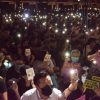In the past three years since we last revised our collective direction, the world has changed drastically: Movements everywhere have been repressed, government counter-revolution has proceeded rapidly, and states across the world have continued to increase their power despite abject failures in adequately addressing the COVID pandemic.
Meanwhile, activists and organizers have either gone underground or into exile, and many have begun to build new and meaningful connections elsewhere. In light of these changes, we recognize the need to update our analysis and focus to better center transnationalism in radical left movements across Asia and its diasporas.1
In this short blog post, we offer up some personal thoughts on our new editorial directions and what we aim to accomplish going forward. You can read our new “About” page here.
Promise Li
It is necessary to strengthen independent left-wing platforms and organizations that can connect the struggles in Hong Kong and China to communities elsewhere. Lausan emerged from a conjunctural gathering of local and diaspora activists who broadly identify with the left that hoped to amplify the pluralism of perspectives during the anti-Extradition Bill protests. This task has brought me deeper into Hong Kong’s submerged histories to recover little-known radical movements resisting forgotten intersections between empires. I follow these roots outward to continue tying Hong Kong’s liberation with the fate of the proletariat class everywhere.
The practice of transforming social relations is first and foremost grounded in the independent self-activity of the masses. However, developing new paradigms for political self-organization and democracy requires dedicated thinkers and organizers that recognize capitalism as a system that needs to be smashed across regions in its totality. More new militants are needed to articulate transitional forms of practical organization to bridge local struggles to a larger revolutionary horizon—while synthesizing their lessons and participating in them.
This belief has led us, like our predecessors, to new encounters and allies abroad. Especially with today’s unprecedented state of government repression, a rebirth of the Hong Kong and Chinese left urgently demands open platforms that enable political debates about our movements’ futures, and which quicken the diaspora’s radicalization and coalitional links to other groups.
In this spirit, we exchanged movement strategies with Puerto Rican feminists during our summer of uprisings in 2019. In the next year, we co-organized programming like the “Transnationally Asian” virtual conference, which put us in political discussion with our allies in Taiwan and parts of Southeast Asia. Our collectives discussed what it means to maintain independent outlets in the age of rival state medias and competing authoritarianisms. More recently, we investigated the inner workings of the rank-and-file organization of Chinese immigrant graduate workers and explored the horizons of global Indigeneity as they help us deepen our understanding of the revolutionary capacity of autonomous communities from Kazakh nomads to Jamaican maroons.
The new “About” page reflects Lausan’s continuing commitment to participating in the collective endeavor of retracing the contours of a global revolutionary left in relation to Hong Kong, especially with other peoples that have experienced not only the traumas of Western imperialism, but have also lived through the failures of state socialisms. I hope for more collaborations that will join us in this undertaking.
Uchiyama
Our collective came into being at a very particular and intense moment in Hong Kong’s recent history. We were focused on how those of us on the left could intervene in the broad currents of the movement against the Extradition Bill. I think all of us in the collective are proud of the interventions we made: how we pushed, nudged and challenged the mainstream movement to consider what a truly liberatory and radical future might look like. This work is far from complete, and we intend to continue to carve out a space for the Hong Kong left.
Still, in the months that have followed since public gatherings were banned by the Hong Kong government and the repression of the anti-Extradition Bill movement became complete, my thinking about the role our collective can play has shifted. In particular, my interest in transnational solidarity, especially across Asia, has increased. For me, this is particularly informed by Asian activism around feminism, gender and sexuality and how these efforts bleed into labor and workplace movements.
There is a rich and revolutionary history of migrant women’s organizing, many of whom are also racialized subjects that continue to build power amongst themselves in the workplace. This history is often excluded from the story of Hong Kong’s political movements, which overlooks the experiences of migrants and immigrants in favor of asserting a false national ethnic homogeneity. By refocusing Lausan’s editorial perspective, I hope we can recover and reinstate these histories to their rightful place, and to support comrades who seek to do the same in other movements across Asia.
The generous love and solidarity we have received from friends and allies in the early days of our collective has also generated a deep political commitment to envisioning radical Asian futures with others who share commitments to anti-imperialism, anti-capitalism and a socialism that is committed to gender, sexual, racial, climate and disability justice. Just as capitalisms around the world are mutually constitutive, the radical left in Asia should be too. Whether we are in Hong Kong, Jakarta, Tokyo, Bangkok or Ürümchi, we share similar struggles and have the same target in view.
I want Lausan to be a space for all of us who are working through these many complexities. As we identify the cracks in the systems of oppression that continue to engulf what we know as Asia, we will pry them open together. Our new “About” page reflects not only the gradual shift that has taken place in our thinking about our role in left spaces, but it also serves as a statement of our intentions as we continue this work.
WF
As someone who came of age during the anti-ELAB movement, Lausan has been an invaluable resource and network for me and many other Hongkongers looking for a progressive way out of Hong Kong’s political quagmire.
The defeat of the social movement in Hong Kong has largely discredited previously dominant paradigms and ideological frameworks of struggle: right-wing nativism and Hong Kong independence, colonial nostalgia, “burnism,” the “international front,” and the cynical neoliberalism of the pan-democratic opposition.
No one at the time could have foreseen the COVID-19 pandemic, nor how the Hong Kong government would weaponize it to defeat the anti-Extradition Bill Uprising. Nor could anyone have foreseen the crushing repression under the National Security Law, and the complete dismantling of Hong Kong’s political society. But in recent years, a glimmer of hope has arisen: the regrouping of Hong Kong’s democracy movement in the diaspora through the organizing work of the hundreds of thousands of Hongkongers who have emigrated to the United Kingdom.
The emergence of this new, politicized diaspora is fertile soil for leftists, long marginalized in Hong Kong’s social movements, to mount progressive, internationalist, and revolutionary interventions in Hongkongers’ struggle for democracy and self-determination. It has given new meaning to Lausan’s mission, and name: The eponymous diaspora alluded to is now one that is well organized, with a sense of collective identity and community grounded in the anti-Extradition Bill movement, and searching for new avenues of resistance and liberation.
Lausan will continue to be a platform for the articulation and discussion of anti-colonial, anti-capitalist, socialist, democratic, and revolutionary imaginations of how struggles in Hong Kong and across Asia (in China and the Chinese diaspora, Taiwan, Myanmar, Thailand, and beyond) can fight and win in this new era of regression and crisis. I hope that we can take an active role in shaping the new directions of struggle taken by these movements.
JN Chien
In the years since we began Lausan, I’ve observed a growing disconnect between struggles in Asian America, the Asian diaspora, and those in Asia. While an incredible surge of youth politicization has swept across the U.S., many of these people are increasingly orienting their politics around an idea of anti-imperialism that suggests that any enemy of the U.S. empire deserves our (often unqualified) support. This political horizon also demands that our revolutionary energy be invested solely into state formations that, as the logic goes, function as the only proper avatar for the agency of a people. Lausan’s editorial efforts have pushed against this limiting framework from the start.
And yet, aided by rising hyper-nationalism and protectionism of the so-called “New Cold War,” such thinking persists. In my view, the one thing that has been made abundantly clear in the past three years of global revolt is the need to expand Asian America’s understanding of the role of Asian people today in anti-capitalist revolution beyond a nostalgic credulity for the comprador governments that succeeded Third World revolutionary states.
For Asian Americans, focusing on movements in Asia and the transpacific that respond directly to U.S. empire (such as those contesting U.S. military occupation in South Korea, Okinawa, Hawaiʻi, Guåhan, and the Philippines) makes complete sense. But it should not come at the expense of—or worse, through the active vilification of—other Asian grassroots movements against non-U.S. colonialism, militarism, developmentalism, and authoritarianism. These are all interdependent, global—not solely American—systems. And, after all, many of those who escape these repressive conditions join the Asian diaspora within “Asian America” itself. In the pursuit of building non-U.S.-centric, left internationalist solidarity, Asian Americans should support those struggles as strongly as they do their own. But how can we practice this principled anti-capitalist anti-imperialism everywhere without inadvertently providing fodder for the U.S. military machine?
This has been a central problematic for us at Lausan and one we aim to continue working through in our new editorial focus. One promising direction has been turning more directly to diaspora as a powerful site of politicization and grassroots exchange for many who face harsh repression due to their social justice activism at home.
In the Hong Kong-China context, the diaspora has been a space where people from both regions can debate and practice liberatory alternatives to authoritarianism and ethnonationalism. It’s also a contact zone where the Asian diaspora can broaden its ideas of coalition and organize locally with those fighting for Indigenous rights, racial justice, gender and sexual liberation, and labor power. Practicing democratic collective action that recognizes our intertwined fates in the capitalist world-system is what the U.S. state and its capitalist rivals most fear.
Some of our recent work—such as our interviews with Chinese international student organizers in the 2022 UC Strike—has focused on these possibilities. Pushing pointedly against the reduction of Chinese diaspora politics to “little pink” hyper-nationalism or anti-communist cooperation with the U.S. state, these interviews spotlight diasporic political voices that argue decisively for their role in building coalitional social justice unionism and anti-capitalist resistance outside China.
This new “About” page expresses our continuing commitment to spotlighting these voices and more as we shift toward engaging broadly with radical movements in Hong Kong, Asia, and its many diasporas.
Footnotes
- Here we recognize “Asia” is a fictitious and always-shifting designation whose use reflects our own geographic and political positionalities. As Arif Dirlik has said, “there is nothing innocent about our spatializations of the world.” With this in mind, we use the term “Asia” in our work going forward not to refer to a neutral and fixed entity with homogeneous political, economic, and cultural interests but to engage flexibly with grassroots movements that stretch from West Asia to South East Asia. This includes social movements engaged in struggle primarily against intra-Asian colonial and sub-imperial practices by allies of the West such as governments in Japan and South Korea, or competitors such as China.




